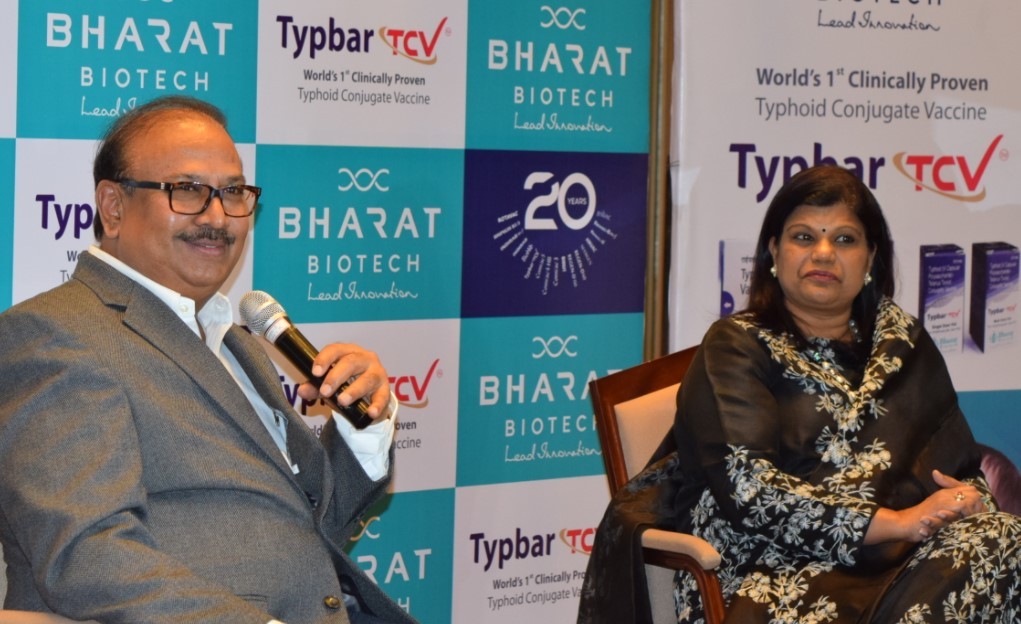Bharat Biotech Typhoid Vaccine ( a Conjugate Vaccine ) Typbar TCV that averts typhoid fever, caused by a drug-resistant bacteria and prevalent in Africa, has been found to be safe and effective for children under the age of 12 in Phase 3 clinical trials.
This study published in The New England Journal of Medicine evaluated the efficacy of a Typhoid conjugate vaccine (Vi-TCV) in Malawi, Africa among children age 9 months through 12 years. Participants will be randomized in a 1:1 ration to receive the study vaccine or the control vaccine (meningococcal group A conjugate vaccine – MCV-A).
The typhoid fever, caused by H58 Salmonella Typhi, a type of bacteria that has become resistant to multiple drugs, is an increasing public health threat in sub-Saharan Africa.
A team of scientists, including researchers from University of Oxford, conducted a Phase 3, double-blind trial in Blantyre, Malawi, to assess the efficacy of Vi polysaccharide typhoid conjugate vaccine (Vi-TCV).
New Typhoid Conjugate Vaccine Study published in NEJ

The efficacy of a Vi polysaccharide typhoid conjugate vaccine (Vi-TCV) was assessed in 28,130 Malawian children who were 9 months to 12 years of age. The incidence of blood culture–confirmed typhoid fever was significantly lower among children who received Vi-TCV than among those who received a control vaccine
Developed by Bharat Biotech, the Vi-TCV or Typbar TCV — the world’s first clinically proven conjugate Typhoid vaccine — contains a carbohydrate from the Salmonella typhi Ty2 bacteria, along with the Tetanus vaccine.
While the Salmonella typhi carbohydrate alone elicits B cell responses, the inclusion of the tetanus vaccine elicits higher-affinity antibodies and long-term immune memory.
Such a vaccine is known as conjugate vaccines — where a weak antigen is combined with a strong antigen — so that the immune system has a stronger response. An antigen is a part of the pathogen that the body can identify.
Conclusion – of Bharat Biotech Typhoid Vaccine Trials in Malawi

The Typbar TCV developed by Bharat Biotech is the world’s first clinically proven conjugate Typhoid vaccine.
India’s top virologist Dr Gagandeep Kang, who is also a professor at the Christian Medical College in Vellore, also tweeted on the development.
In the latest clinical trial, the results of which have been published in the journal NEJM, researchers randomly assigned 28,130 children who were between 9 months and 12 years of age to either receive a single dose of Vi-TCV or meningococcal capsular group A conjugate (MenA) vaccine.
Blood culture tests confirmed typhoid fever occurred in 12 children among the 14,069 children in the Vi-TCV group and in 62 children in the MenA group of 14,061 children.
Among Malawian children, administration of Vi-TCV resulted in a lower incidence of blood culture, confirmed typhoid fever, than the MenA vaccine. The vaccine was found to provide a protective efficacy of 80.7 per cent.
The efficacy of Vi-TCV was similar in children who were younger than five years of age and children who were five years of age or older at the time of vaccination, and this efficacy remained consistent throughout the observation period.
In total, 130 serious adverse events occurred in the first 6 months after vaccination — 52 in the Vi-TCV group and 78 in the MenA group — including 6 deaths (all in the MenA group). No serious adverse events were considered by the investigators to be related to vaccination.
In their papers, researchers noted that efficacy of Vi-TCV after 18 to 24 months was consistent with a previously reported efficacy of 81.6 per cent after 12 months of follow-up among Nepalese children of 9 months to 16 years of age.
The team said that despite a 2008 WHO recommendation for programmatic use of existing vaccines in countries in which typhoid is endemic, no African country integrated these vaccines into routine schedules, largely because of the unsuitability of their use in the youngest children and the need for repeated doses.
Malawi, where the trial was conducted, has a high prevalence of typhoid among school-age and preschool children.
Based on their findings, the team now recommends a routine introduction of Vi-TCV among infants, coupled with catch-up campaigns targeting children up to the age of 15 years to control drug-resistant typhoid.






